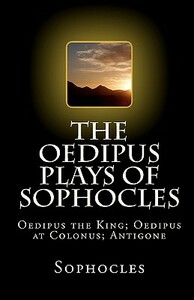Take a photo of a barcode or cover
548 reviews for:
The Oedipus Plays of Sophocles: Oedipus the King; Oedipus at Colonus; Antigone
Sophocles
548 reviews for:
The Oedipus Plays of Sophocles: Oedipus the King; Oedipus at Colonus; Antigone
Sophocles
Greek tragedies are truly unmatched. Of the three plays, I absolutely loved the first two. Oedipus’s lore is honestly fascinating. And it brings about a good debate in fate versus free will!! Anyways, my Greek mythology nerdiness showed up big time in these, but honestly recommend for anyone!! Also just crazy to think these were written before Jesus was born!!
dark
emotional
reflective
sad
fast-paced
Plot or Character Driven:
A mix
Strong character development:
Complicated
Loveable characters:
Yes
Diverse cast of characters:
No
Flaws of characters a main focus:
Yes
dark
reflective
tense
fast-paced
The Oedipus Cycle is the epitome of Greek tragedies.
Oedipus Rex is the beginning... Classic.
I felt like Oedipus at Colonus was more of a placeholder/transition into Antigone. It’s purpose, I think, was just to end Oedipus’s story.
Antigone is by far my favorite in the Oedipus Cycle. It contains some similar components to Oedipus Rex (prophecy, the wives killing themselves, not acting on prophecy early enough... etc.).
“There is no happiness where there is no wisdom;
No wisdom but in submission to the gods.
Big words are always punished,
And proud men in old age learn to be wise.”
Oedipus Rex is the beginning... Classic.
I felt like Oedipus at Colonus was more of a placeholder/transition into Antigone. It’s purpose, I think, was just to end Oedipus’s story.
Antigone is by far my favorite in the Oedipus Cycle. It contains some similar components to Oedipus Rex (prophecy, the wives killing themselves, not acting on prophecy early enough... etc.).
“There is no happiness where there is no wisdom;
No wisdom but in submission to the gods.
Big words are always punished,
And proud men in old age learn to be wise.”
mysterious
slow-paced
Plot or Character Driven:
A mix
Strong character development:
No
Loveable characters:
No
Diverse cast of characters:
No
Flaws of characters a main focus:
Yes
challenging
dark
funny
fast-paced
Plot or Character Driven:
Plot
Strong character development:
No
Loveable characters:
Yes
Diverse cast of characters:
No
Flaws of characters a main focus:
Yes
the world has never been the same since. we owe psychology to this book
dark
slow-paced
Plot or Character Driven:
Plot
Strong character development:
Yes
Loveable characters:
No
Diverse cast of characters:
No
Flaws of characters a main focus:
Yes
dark
emotional
reflective
sad
medium-paced
Plot or Character Driven:
A mix
Strong character development:
Yes
Loveable characters:
Complicated
Diverse cast of characters:
No
Flaws of characters a main focus:
Yes
1. Oedipus Rex
Oedipus is the beloved ruler of the city of Thebes, whose citizens are suffering from plague. Consulting the Delphic oracle, Oedipus is told that the plague will end when the murderer of Queen Jocasta’s first husband, King Laius, has been found and punished. Oedipus resolves to find Laius’s killer, but his investigation uncovers his hidden past when he discovers that the old man he killed when he first approached Thebes as a youth was his own father, Laius, and that his wife is in fact his mother. At the end, Jocasta hangs herself in shame, and the guilt-stricken Oedipus blinds himself.
Like anyone who grew up as a kid reading Greek mythology, I knew the plot of the Oedipus myth going in, but I was unprepared for how much this play comes in swinging with the writing. There are sections in this boko that are brutal enough to put any modern grimdark author to shame:
Oedipus is the beloved ruler of the city of Thebes, whose citizens are suffering from plague. Consulting the Delphic oracle, Oedipus is told that the plague will end when the murderer of Queen Jocasta’s first husband, King Laius, has been found and punished. Oedipus resolves to find Laius’s killer, but his investigation uncovers his hidden past when he discovers that the old man he killed when he first approached Thebes as a youth was his own father, Laius, and that his wife is in fact his mother. At the end, Jocasta hangs herself in shame, and the guilt-stricken Oedipus blinds himself.
Like anyone who grew up as a kid reading Greek mythology, I knew the plot of the Oedipus myth going in, but I was unprepared for how much this play comes in swinging with the writing. There are sections in this boko that are brutal enough to put any modern grimdark author to shame:
Such was the burden of his moan, whereto,
Not once but oft, he struck with his hand uplift
His eyes, and at each stroke the ensanguined orbs
Bedewed his beard, not oozing drop by drop,
But one black gory downpour, thick as hail.
It's a classic for a reason, and it holds up. As a story about hubris it's still very effective, as an exploration (and I would argue critique - though prehaps not as much so as the later Antigone) of ancient Greek ideals of honour and heroism, it contains so much.
------------------------------------------------------------------
2. Oedipus at Colonus
On reading, this is definitely the least gripping and dramatic of the three 'Theban' plays. However, there's something to be said about it's more contemplative, melancholy and redemptive mood. I've also been thinking about it a lot more after reading Tobin Siebers description "no one ever sees Sophocle's play as a drama about a cripple and a blind man fighting over Thebes".
An old Oedipus with his daughters Antigone and Ismene, having suffered much in the years since Oedipus Rex, takes rest outside of Athens on sacred ground. Oedipus knows he is dying and also that his last resting place has been promised divine protection. He beseeches the king of Athens (Theseus) blessing to die and be buried at Colonus (which is granted) and rejects his sons entreaties and threats to return to Thebes. Throughout the play, Oedipus' heroic nature appears to be redeemed - with Sophocles "heroic humanism" apparently making a statement about the ability for humanity to transcend evil actions.
------------------------------------------------------------------
3. Antigone
My favourite of the three Theban plays - Antigone is such an amazing character, one who is proud and angry but also driven above all else by love. She is a great example of a character with very limited power against a state still finding a way to exercise a control of their own - even in sacrifice. Despite the fact that Creon has all the power of the state, and Antigone is the daughter and sister of exiles and rebels, the play casts him as the one left trapped and defeated by the very trapping of his own powerful state.
I will bury him myself. And even if I die in the act, that death will be a glory. I will lie with the one I love and loved by him—an outrage sacred to the gods!
Antigone, daughter of Oedipus, chooses to defy the king Creon to bury the body of her brother - knowing the punishment will be death. Unwilling to bend the literal rule of the law in favour of Antigone's ethical (and divine - the god back her on this one!) argument, Creon has her buried alive. His own son Haemon, who loved Antigone, kills himself out of grief and solidarity and Creon's wife, Eurydice, kills herself hearing the death of her son (paralleling the events of Oedipus Rex). Creon is left alone, punished by his unwillingness to follow human moral obligation over rigid civil duty.
dark
emotional
reflective
sad
medium-paced


